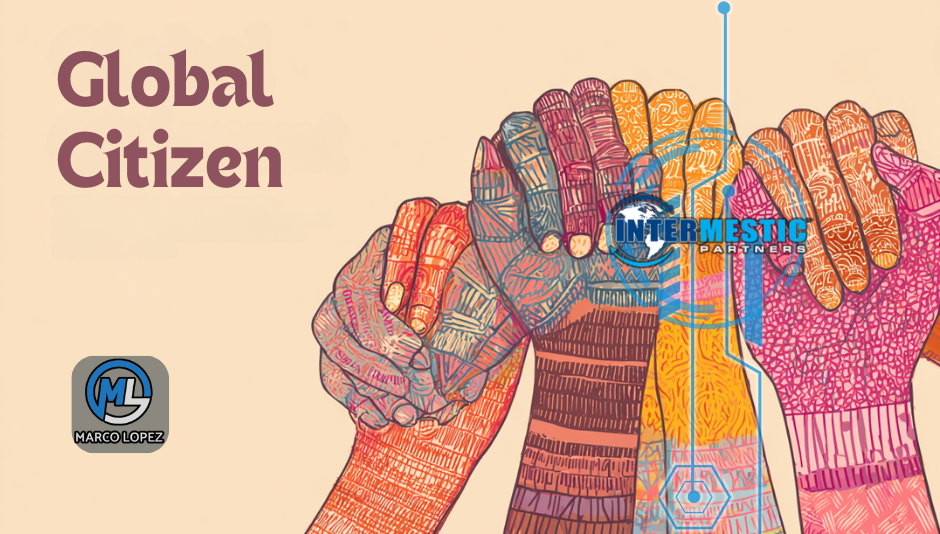Immigration: America’s Competitive Edge in a Global Economy
- Marco Lopez

- Aug 7
- 2 min read

From its founding, the United States has been defined by immigration—an infusion of cultures, skills, and perspectives that has shaped its economy, society, and place in the world. Today, more than 44 million immigrants—13.7% of the population—call America home, representing virtually every nation. This diversity is more than a demographic fact; it’s a strategic asset in the race for global competitiveness.
As a former mayor of a U.S.-Mexico border city, leader of Arizona’s Department of Commerce, and CEO of Intermestic Partners—the international business advisory firm I founded in 2011—I’ve seen firsthand how immigration powers innovation, strengthens industries, and connects America to the world’s talent.
Immigrants as Innovation Drivers
Over 55% of America’s billion-dollar startups have at least one immigrant founder.
Leaders like Sergey Brin (Google) and Pierre Omidyar (eBay) are testaments to the transformative impact of immigrant entrepreneurship.
Immigrants contributed to 75% of patents from the top 10 U.S. patent-producing universities (NFAP).
Diversity of thought and experience fuels creativity, leading to solutions that serve a broader and more global audience.
Economic Impact: Facts vs. Myths
Concerns about job competition and wage pressure often dominate political debate. Yet research from the National Academies and Cato Institute shows:
Immigrants have little to no negative effect on native-born wages.
They are less likely to use welfare and, when they do, receive less on average.
Immigrants commit crimes at lower rates than native-born citizens.
Instead of taking jobs, many immigrants create them—through startups, small businesses, and investment.
Immigration as a Strategic Advantage
In a globalized, knowledge-based economy, human capital is as critical as physical capital. Countries compete to attract skilled talent, and America’s relatively open system—compared to nations like Japan—has been a magnet for top minds.
The U.S. tech sector’s dominance is inseparable from decades of attracting global talent through universities, research labs, and corporate recruitment.
Balancing Opportunity and Security
While the benefits are clear, immigration policy still needs modernization. Effective reform should:
Safeguard national security
Streamline pathways for skilled and essential workers
Strengthen integration and workforce readiness programs
The challenge is to maintain openness without compromising stability.
The Road Ahead
America’s future competitiveness hinges on getting immigration policy right.
Overly restrictive laws risk driving talent elsewhere.
Thoughtful liberalization, paired with integration and security measures, could expand the U.S. lead in innovation and entrepreneurship.
At Intermestic Partners, we help organizations leverage cross-border talent strategies to compete in this global talent marketplace.
Bottom line: Immigration isn’t just part of America’s story—it’s central to its strategy. Balancing inclusion, security, and integration will determine whether the U.S. remains the world’s premier destination for talent, ideas, and opportunity.
.png)




Hello, Turkish Airlines made our trip exceptional even before we boarded the aircraft. The Turkish Airlines Chicago Office personnel made sure we had everything ready, including mobility assistance, lunches, seats, and even check-in time reminders. "That was so nice," my mother remarked, holding my hand as we left. I realised then that we had picked the appropriate airline for comfort, dignity, and peace of mind in addition to service.
Thank you for taking the time to write such an informative post.
I am Komal Nigam, SEO Executive at Travelogy India Pvt. Ltd. in Delhi NCR. This company is a Travel Agency.
If you want to travel to India by Luxury Train, the Maharajas’ Express is one of the world’s most luxurious trains. It offers four itineraries (3-7 days) with fares starting at $4,650, covering destinations such as Mumbai, Delhi, Jaipur, and UNESCO World Heritage sites like Agra.
Here’s everything you need to know about its route, itinerary, booking process, and ticket details. Visit here –
Maharajas Express Route
Maharajas Express Ticket Price
Maharajas Express Itinerary
Maharaja Express Journeys
Maharajas Express Departure Date
For inquiries or bookings, please contact:
Phone: +91…
Thank you for this amazing article 🌏 I’d also love to share some tips about choosing the right words—because the right caption can make your Everest Three High Pass Trek photos shine even brighter.
Thank you for this amazing article! I’d also love to see some tips about Instagram captions—because the right words can make your travel photos shine even brighter.
In the heart of Mumbai’s night, Mumbai escorts shine like stars, bringing warmth and desire to every moment. These escorts in Mumbai turn ordinary evenings into passionate adventures, making you feel alive with every glance and touch. Their presence is a promise of unforgettable memories.
The charm of Mumbai call girls is in their gentle care and fiery passion. These call girls in Mumbai know how to make you feel special and wanted, creating moments that linger in your heart long after they’re gone. Every encounter is a story of pleasure and connection.